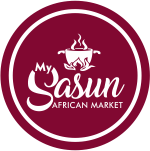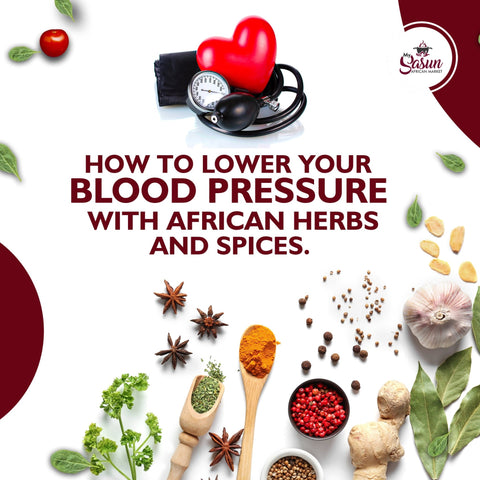African herbs and spices have been used for centuries to treat various health conditions, including high blood pressure. High blood pressure, or hypertension, is a major risk factor for heart disease and stroke, which are among the leading causes of death worldwide. According to some studies, certain African herbs and spices may help lower blood pressure by relaxing the blood vessels, reducing inflammation, and improving blood flow. Here are some examples of African herbs and spices that may have antihypertensive effects:
- Cinnamon:
Cinnamon is a spice that comes from the inner bark of trees from the Cinnamomum genus. It may help dilate and relax the blood vessels, which can lower blood pressure. You can add cinnamon to your oatmeal, pap, coffee, tea, or baked goods. Get your Cinnamon sticks from My Sasun African Market if you are in the US or Canada here
- Garlic:
Garlic is a herb that contains allicin, a compound that may help relax blood vessels and improve blood flow. A review of 12 trials and 553 hypertensive participants confirmed that garlic supplements lower systolic blood pressure and diastolic blood pressure similarly to standard anti-hypertensive medications. It was found that garlic can lower blood pressure in people with hypertension, especially when taken for more than two months. Garlic may also have other benefits for heart health, such as lowering cholesterol and preventing blood clots. You can enjoy the benefits in garlic in so many ways. Here are 4:
- Raw garlic: Eating fresh, raw garlic is one among the herbal remedies for controlling high blood pressure.
- Garlic powder: Including garlic in your daily diet can lower your blood pressure.
- Salads: You can also add thin slices of garlic directly to your favourite salads.
- Garlic milk: This drink works as a medicine and is beneficial for your overall health.
- Turmeric:
Turmeric is a spice that gives curry its yellow color. It contains curcumin, a compound that has anti-inflammatory and antioxidant properties. It may help lower blood pressure by preventing the buildup of plaque in the arteries. You can use turmeric to spice up your rice, lentils, vegetables, or meat dishes. My Sasun African Market has a variety of original brands of turmeric. Find them here.
- Hibiscus:
Hibiscus is a flower that can be brewed into a tea. It is known in Nigeria as Zobo or Sobo. It may help lower blood pressure by acting as a diuretic, which means it helps the body get rid of excess water and salt. You can drink hibiscus tea hot or cold, with or without sweeteners.
- Bitter leaf:
Bitter leaf is a herb that is native to Africa. It may help lower blood pressure by reducing the levels of cholesterol and triglycerides in the blood. You can eat bitter leaf as a salad, in soups and stews, or as juice. If you are in the US or Canada, you can get bitter leaf at My Sasun African Market.
- Soursop (Graviola):
Soursop is a fruit that comes from a small evergreen tree. It may help lower blood pressure by dilating and relaxing the blood vessels. Researchers discovered in a 2012 experiment on rats that graviola can lower blood pressure without affecting heart rate. The scientists explained that the herb’s ability to reduce blood pressure is related to its impact on calcium ions. You can eat soursop as a fruit, juice, or tea. However, soursop may also have some side effects, such as lowering blood sugar and causing uterine contractions, so it should be used with caution. Pregnant women especially shouldn’t eat this without medical guidance.
- Baobab:
Baobab is a fruit that grows on a large tree native to Africa, Arabia and Australia. It may help lower blood pressure by providing potassium, magnesium, and antioxidants. Baobab powder is a versatile ingredient that you can use in various ways. You can add it to your breakfast bowl, blend it with your smoothies, or bake it into your treats. You can also enjoy baobab juice or tea, which are popular beverages in some African countries. Baobab has a delicious, sour-sweet taste that goes well with many kinds of foods and drinks. Read more about its miraculous properties in relation to high blood pressure here.
- Moringa:
Moringa is a plant that has edible leaves, pods, and seeds. It may help lower blood pressure by supplying antioxidants, anti-inflammatory compounds, and calcium. You can eat moringa as a vegetable in your soup/stew, as a herbal tea, or supplement. According to Dr. Tiago Bittencourt Espindula, There is preliminary evidence from some scientific studies showing that foods derived from the Moringa plant can help reduce blood pressure. A study also published in Phytotherapy Research found that Moringa leaf extract has a significant effect in reducing blood pressure levels in test subjects. Check here for some varieties of Moringa products if you are in US or Canada.
Aloe vera:
Aloe vera is a plant that has a gel-like substance inside its leaves. It may help lower blood pressure by enhancing blood circulation and reducing cholesterol, triglycerides, and glucose. You can drink aloe vera as a juice or take it as a supplement. A study conducted recently involved 90 non-insulin-dependent diabetic patients who took either 100 mg or 200 mg of aloe vera gel powder in capsules daily, or nothing, for three months. After three and six months, the researchers checked the subjects and saw that both aloe vera groups had lower systolic and diastolic blood pressures, unlike the no-treatment group. The researchers attributed this to two anti-inflammatory substances in aloe vera — aloe-emodin and aloin.
Rounding Off:
These are some of the herbs and spices that may help lower your blood pressure, but they are not a substitute for medical advice or treatment. You should always consult your doctor before using any herbal remedies, especially if you have any health conditions or take any medications. Some herbs and spices may interact with your medications or cause side effects. Also, remember that lowering your blood pressure requires a healthy lifestyle that includes a balanced diet, regular exercise, stress management, and avoiding smoking and alcohol. Herbal remedies should be used as a supplement to, not a replacement for, a healthy lifestyle and prescribed treatment plan.







Comments (2346)
I can’t believe this is happening. I never believe there is cure to this herpes virus because they all say there is no cure for the virus, a few months ago I came across this site on the internet with several messages shared by people who got rid of herpes virus with the help of herbal medication from an ancient herbal man. I contacted the man through his website and asked for the medicine also, he informed me about the cure process and this man sent me the herbal medicine which I drink according to the way he instructed for weeks. I couldn’t believe it when I went for a test several times and my result came out negative and all the symptoms flare up were gone the moment I started the medicine. I’m so happy to share this to the world that there is a real cure to herpes’ you can reach and also know about this herbalist on his website.. https://excelherbalcure.com
A friend of mine that got diagnosed with Herpes was cured with the help of a great herbal doctor, so I decided to contact him for help in getting rid of my genital herpes virus! then I was told to provide my address to receive the meds which I did and now I am the happiest person on earth because I am writing this with joy and happiness in my heart to the whole world to know that natural herbal medicine can actually cure this virus called herpes. I’m a living testimony of doctor excel ancient traditional herbal cure and I want you all to contact him via his web and get yourself cured from that silly virus: https://excelherbalcure.com I have just tested negative to the virus after having it for many years…
A herbalist has restored my life by curing me from a nasty virus, He has helped me and my friend in situations of Herpes virus. He cured me with his herbal medicine that was delivered through DHL for me to drink. there is no harm in trying to get help curing your mess so get to know about this herbal man and his herbal medicine on his website if you’re in same situation because he’s got potentials in putting herbs together to cure that parasite called herpes: excelherbalcure.com
Buy real and fake Passports, Drivers License , Id Card (WHATSAPP:+33 7 53827675)
Buy passports online (WHATSAPP:+33 7 53827675), buy legal US passports, buy Chinese passports, , buy Canadian passports, buy driver’s license, buy Hong Kong passports, buy Taiwan passports, legal biometric passports, buy US passports, buy Australian passports, buy passports registered in government databases
BUY COUNTERFEIT MONEY, CLONE CREDIT CARDS, GBP, DOLLAR, EUROS (WHATSAPP:+33 7 53827675)
Buy counterfeit money. (WHATSAPP:+33 7 53827675) Buy US Dollars (USD), Chinese Yuan (RMB), (WhatsApp: +33 7 53827675), Canadian Dollars (CAD), Australian Dollars (AUD), British Pounds (GBP), Euros (EUR), and Hong Kong Dollars ($HK). Buy high-quality, unverified banknotes.
Buy a passport online (WHATSAPP: (33 7 53827675), buy a legitimate US passport, buy a Chinese passport, (WHATSAPP:33 7 53827675), buy a Canadian passport, buy a Hong Kong passport, buy a Taiwanese passport, a legitimate biometric passport, buy a US passport, buy an Australian passport, buy a passport registered in the government database, buy a Canadian residence permit (RP card), obtain US citizenship and a green card, where can I get a passport? (WHATSAPP:+33 7 53827675), buy a driver’s license, renew your passport online.
Buy TOEFL, IELTS, TOEIC (WHATSAPP: (33 7 53827675, buy Canadian citizenship, buy US citizenship, buy Canadian TCF, TEF, CELPIP, Celta certificates, Canadian residency, direct immigration to Canada, buy driver’s licenses, ID cards, buy US green cards, citizenship (WHATSAPP: +33 7 53827675), buy Social Security Numbers (SSN), work permits, get new ID cards, National Insurance Cards, NINs, SINs, buy SSNs, buy marriage certificates, birth certificates. Order online (WHATSAPP:33 7 53827675)
Do you want to start a new Second Life with a new identity, protect your privacy, create a new credit history, bypass criminal record checks, and regain your freedom?
WHATSAPP:+33 7 53827675
Our company has many years of experience producing Real and fake passports and other identification documents. We use high-quality equipment and materials to create fake passports. We meticulously replicate all the secret features of genuine passports to create these fake documents. We are the best manufacturer of high-quality fake IDs.
Telegram: @propnotescartel
Email: sales.propcounterfeitnotes@gmail.com
Website : (https://propcounterfeitnotes.com)
Buy real and fake Passports, Drivers License , Id Card (WHATSAPP:+33 7 53827675)
Buy passports online (WHATSAPP:+33 7 53827675), buy legal US passports, buy Chinese passports, , buy Canadian passports, buy driver’s license, buy Hong Kong passports, buy Taiwan passports, legal biometric passports, buy US passports, buy Australian passports, buy passports registered in government databases
BUY COUNTERFEIT MONEY, CLONE CREDIT CARDS, GBP, DOLLAR, EUROS (WHATSAPP:+33 7 53827675)
Buy counterfeit money. (WHATSAPP:+33 7 53827675) Buy US Dollars (USD), Chinese Yuan (RMB), (WhatsApp: +33 7 53827675), Canadian Dollars (CAD), Australian Dollars (AUD), British Pounds (GBP), Euros (EUR), and Hong Kong Dollars ($HK). Buy high-quality, unverified banknotes.
Buy a passport online (WHATSAPP: (33 7 53827675), buy a legitimate US passport, buy a Chinese passport, (WHATSAPP:33 7 53827675), buy a Canadian passport, buy a Hong Kong passport, buy a Taiwanese passport, a legitimate biometric passport, buy a US passport, buy an Australian passport, buy a passport registered in the government database, buy a Canadian residence permit (RP card), obtain US citizenship and a green card, where can I get a passport? (WHATSAPP:+33 7 53827675), buy a driver’s license, renew your passport online.
Buy TOEFL, IELTS, TOEIC (WHATSAPP: (33 7 53827675, buy Canadian citizenship, buy US citizenship, buy Canadian TCF, TEF, CELPIP, Celta certificates, Canadian residency, direct immigration to Canada, buy driver’s licenses, ID cards, buy US green cards, citizenship (WHATSAPP: +33 7 53827675), buy Social Security Numbers (SSN), work permits, get new ID cards, National Insurance Cards, NINs, SINs, buy SSNs, buy marriage certificates, birth certificates. Order online (WHATSAPP:33 7 53827675)
Do you want to start a new Second Life with a new identity, protect your privacy, create a new credit history, bypass criminal record checks, and regain your freedom?
WHATSAPP:+33 7 53827675
Our company has many years of experience producing Real and fake passports and other identification documents. We use high-quality equipment and materials to create fake passports. We meticulously replicate all the secret features of genuine passports to create these fake documents. We are the best manufacturer of high-quality fake IDs.
Telegram: @propnotescartel
Email: sales.propcounterfeitnotes@gmail.com
Website : (https://propcounterfeitnotes.com)
I found out that herbal medicine is the best way to get rid of herpes because I have just been cured from the virus, I took the healing process by contacting dr excel for natural herbal treatment which really works wonders by neutralizing the virus, I don’t feel the horrible symptoms and outbreaks anymore and my medical doctor told me the virus is gone after several test and I’m glad I finally got cured from this nasty disease. anyone with herpes should get in touch with this herbal man on his website to get cured from that virus. https://excelherbalcure.com his WhatsApp number +1(509) 883 9893
MY BITCOIN RECOVERY EXPERENCE 2026
I lost about $64,000 to a fake cryptocurrency trading platform a few weeks back after I got lured into the trading platform with the intent of earning a 15% profit daily trading on the platform. It was a hell of a time for me as I could hardly pay my bills and got me ruined financially. I had to confide in a close friend of mine who then introduced me to this crypto recovery team with the best recovery jetwebhackers i contacted them and they were able to completely recover my stolen digital assets with ease. Their service was superb, and my problems were solved in swift action, It only took them 72 hours to investigate and track down those scammers and my funds were returned to me. I strongly recommend this team to anyone going through a similar situation with their investment or fund theft to look up this team for the best appropriate solution to avoid losing huge funds to these scammers…
Email: Jetwebhackers @gmail .com
WhatsApp: +1 (260) 228-9998
MY BITCOIN RECOVERY EXPERENCE 2026
I lost about $64,000 to a fake cryptocurrency trading platform a few weeks back after I got lured into the trading platform with the intent of earning a 15% profit daily trading on the platform. It was a hell of a time for me as I could hardly pay my bills and got me ruined financially. I had to confide in a close friend of mine who then introduced me to this crypto recovery team with the best recovery jetwebhackers i contacted them and they were able to completely recover my stolen digital assets with ease. Their service was superb, and my problems were solved in swift action, It only took them 72 hours to investigate and track down those scammers and my funds were returned to me. I strongly recommend this team to anyone going through a similar situation with their investment or fund theft to look up this team for the best appropriate solution to avoid losing huge funds to these scammers…
Email: Jetwebhackers @gmail .com
WhatsApp: +1 (260) 228-9998
BUY HOUSEHOLD AND PERSONAL HYGIENE SUPPLIES
WHOLESALE SUPPLIERS OF BEAUTY AND LAUNDRY DETERGENTS
https://eborltd.com/product/aveeno-baby-wash-shampoo-236ml/
https://eborltd.com/product/nivea-waterlily-oil-shower-gel-6-x-250ml/
https://eborltd.com/product/loreal-shower-gel-shampoo-for-men/
https://eborltd.com/product/cerave-facial-cleansing-cream/
https://eborltd.com/product/cerave-intensive-moisturizing-lotion/
https://eborltd.com/product/cerave-moisturizing-face-and-body-cleansing-cream/
https://eborltd.com/product/cerave-sa-salicylic-acid-smoothing-cleanser-for-dry-skin-236ml/
https://eborltd.com/product/palmolive-3-in-1-energizing-man-500ml/
https://eborltd.com/product/lux-shower-gel-600ml-charming-peony/
https://eborltd.com/product/heads-and-shoulders-250ml/
https://eborltd.com/product/dove-intense-nutrition-shower-gel-250-ml/
https://eborltd.com/product/dove-douchegel-men-care-hydrating-clean-comfort-400ml/
https://eborltd.com/product/olay-ultra-moisture-body-wash-600ml/
https://eborltd.com/product/dove-douche-deeply-nourishing-225ml/
https://eborltd.com/product/nivea-lemon-oil-shower-gel-250ml/
https://eborltd.com/product/dove-intense-nutrition-shower-gel-250ml/
https://eborltd.com/product/omo-powder-laundry-detergent/
https://eborltd.com/product/lenor-scent-boosters-495g/
https://eborltd.com/product/lenor-professional-sea-breeze-fabric-softener-4l/
https://eborltd.com/product/dash-pods-laundry-detergents-3-in-1/
https://eborltd.com/product/colgate-toothpaste-triple-action-75ml/
https://eborltd.com/product/colgate-sensitive-foam-whitening-toothpaste-75ml/
https://eborltd.com/product/colgate-advanced-white-toothpaste-100ml/
https://eborltd.com/product/colgate-toothpaste-max-white-75ml/
https://eborltd.com/product/colgate-extra-clean-toothbrush-3-pack/
https://eborltd.com/product/colgate-toothbrush-for-kids-4-6-years/
https://eborltd.com/product/colgate-premier-clean-toothbrush-pack-of-4/
https://eborltd.com/product/colgate-plax-mouthwash-soft-mint-500ml/
https://eborltd.com/product/colgate-max-mouthwash-500-ml/
https://eborltd.com/product/listerine-mouthwash-500ml/
https://eborltd.com/product/foam-soap-dispenser-black-individual/
https://eborltd.com/product/lynx-excite-mens-shower-gel-250ml/
https://eborltd.com/product/lynx-ice-chill-body-wash-225ml/
https://eborltd.com/product/loreal-men-shower-gel-300-ml/
https://eborltd.com/product/loreal-men-expert-hydra-energetic-extreme-sport-shower-gel/
https://eborltd.com/product/lynx-africa-aerosol-body-spray-150-ml/
https://eborltd.com/product/lynx-gold-deodorant-bodyspray-150ml/
https://eborltd.com/product/dove-women-deodorant-spray-200ml/
https://eborltd.com/product/dove-deodorant-floral-scent-women-200ml/
https://eborltd.com/product/sure-rexona-roll-on-50ml/
https://eborltd.com/product/vichy-homme-roll-on-sensitive-skin-50ml/
https://eborltd.com/product/nivea-sensitive-protect-roll-on-50ml/
https://eborltd.com/product/sure-men-rexona-invisible-ice-deodorant-200ml/
https://eborltd.com/product/sure-rexona-men-deodorant-150ml/
https://eborltd.com/product/loreal-men-roll-on-50ml/
https://eborltd.com/product/dove-men-antiperspirant-2-7-oz-76-g/
https://eborltd.com/product/nivea-men-deodorant-fresh-active-spray-250ml/
https://eborltd.com/product/axe-body-spray-deodorants-150ml/
https://eborltd.com/product/head-and-shoulders-anti-dandruff-shampoo-500ml/
https://eborltd.com/product/palmers-cocoa-butter-firming-butter-body-lotion-315ml/
https://eborltd.com/product/johnsons-pure-baby-oil-500ml/
https://eborltd.com/product/vaseline-petroleum-jelly-original-13-oz/
https://eborltd.com/product/nivea-creme-tin-display-200ml/
https://eborltd.com/product/nivea-soft-cream-200ml/
https://eborltd.com/product/nivea-rich-nourishing-body-lotion-400ml/
https://eborltd.com/product/lenor-liquid-fabric-softener-86-washes/
https://eborltd.com/product/soupline-fabric-softener-2-85l/
https://eborltd.com/product/downy-ultra-fabric-liquid-softener-800ml/
https://eborltd.com/product/soupline-fabric-softener-2-85l/
https://eborltd.com/product/evans-florazol-concentrated-deodoriser-bouquet-4-x-1-litre/
https://eborltd.com/product/evans-vanodine-odour-neutraliser-fabric-freshener-750ml/
https://eborltd.com/product/febreze-aprilfrisch-air-freshener-spray-300ml/
https://eborltd.com/product/huggies-natural-care-baby-wipes/
https://eborltd.com/product/tampax-compak-regular-22-tampons/
https://eborltd.com/product/huggies-diapers-126-diapers-giga-packs/
https://eborltd.com/product/always-ultra-sanitary-napkins/
https://eborltd.com/product/pampers-premium-protection-baby-diapers-180-count/
https://eborltd.com/product/the-pink-stuff-washing-up-spray-500ml/
https://eborltd.com/product/fairy-liquid-pink-spring-150ml/
https://eborltd.com/product/finish-gel-liquid-dishwasher-detergent-2-12kg/
https://eborltd.com/product/dishwashing-liquid-38-oz/
https://eborltd.com/product/palmolive-ultra-dishwashing-liquid-32-5-oz/
https://eborltd.com/product/ajax-ultra-liquid-dish-soap-1l/
https://eborltd.com/product/fairy-dishwashing-liquid-lemon-433ml/
https://eborltd.com/product/pril-5-original-dishwasher-liquid-detergent/
https://eborltd.com/product/paic-lemon-washing-up-liquid-750ml/
https://eborltd.com/product/dawn-ultra-dish-detergent-473ml/
https://eborltd.com/product/ace-stain-remover-1l/
https://eborltd.com/product/lysol-laundry-sanitizer-90fl/
https://eborltd.com/product/persil-3-in-1-washing-capsules-60-washes/
https://eborltd.com/product/omo-active-front-laundry-powder-1kg/
https://eborltd.com/product/gain-powder-laundry-detergent-106-loads/
https://eborltd.com/product/skip-laundry-detergents-spring-fresh-1-5l/
https://eborltd.com/product/purex-liquid-laundry-detergent-57-loads/
https://eborltd.com/product/persil-laundry-detergent-powder-90-loads/
https://eborltd.com/product/tide-laundry-detergent-pods/
https://eborltd.com/product/tide-liquid-laundry-detergent/
https://eborltd.com/product/wheel-detergent-powder-2-in-1/
https://eborltd.com/product/oxydol-powder-laundry-detergent-16-oz/
https://eborltd.com/product/persil-liquid-detergent-24-washes/
https://eborltd.com/product/fresh-start-laundry-liquid-detergents-64-pods/
https://eborltd.com/product/dash-liquid-detergents-56-washes/
https://eborltd.com/product/breeze-liquid-detergent-550ml/
https://eborltd.com/product/bold-washing-powder-detergent/
https://eborltd.com/product/ariel-laundry-detergent-xxl-mega-pack/
https://eborltd.com/product/ariel-all-in-1-pods-detergents/
https://eborltd.com/product/ariel-powder-laundry-detergent/
https://eborltd.com/product/ariel-original-washing-liquid/
BUY CHEAP HOUSEHOLD CLEANING PRODUCTS
https://eborltd.com/product/aveeno-baby-wash-shampoo-236ml/
https://eborltd.com/product/nivea-waterlily-oil-shower-gel-6-x-250ml/
https://eborltd.com/product/loreal-shower-gel-shampoo-for-men/
https://eborltd.com/product/cerave-facial-cleansing-cream/
https://eborltd.com/product/cerave-intensive-moisturizing-lotion/
https://eborltd.com/product/cerave-moisturizing-face-and-body-cleansing-cream/
https://eborltd.com/product/cerave-sa-salicylic-acid-smoothing-cleanser-for-dry-skin-236ml/
https://eborltd.com/product/palmolive-3-in-1-energizing-man-500ml/
https://eborltd.com/product/lux-shower-gel-600ml-charming-peony/
https://eborltd.com/product/heads-and-shoulders-250ml/
https://eborltd.com/product/dove-intense-nutrition-shower-gel-250-ml/
https://eborltd.com/product/dove-douchegel-men-care-hydrating-clean-comfort-400ml/
https://eborltd.com/product/olay-ultra-moisture-body-wash-600ml/
https://eborltd.com/product/dove-douche-deeply-nourishing-225ml/
https://eborltd.com/product/nivea-lemon-oil-shower-gel-250ml/
https://eborltd.com/product/dove-intense-nutrition-shower-gel-250ml/
https://eborltd.com/product/omo-powder-laundry-detergent/
https://eborltd.com/product/lenor-scent-boosters-495g/
https://eborltd.com/product/lenor-professional-sea-breeze-fabric-softener-4l/
https://eborltd.com/product/dash-pods-laundry-detergents-3-in-1/
https://eborltd.com/product/colgate-toothpaste-triple-action-75ml/
https://eborltd.com/product/colgate-sensitive-foam-whitening-toothpaste-75ml/
https://eborltd.com/product/colgate-advanced-white-toothpaste-100ml/
https://eborltd.com/product/colgate-toothpaste-max-white-75ml/
https://eborltd.com/product/colgate-extra-clean-toothbrush-3-pack/
https://eborltd.com/product/colgate-toothbrush-for-kids-4-6-years/
https://eborltd.com/product/colgate-premier-clean-toothbrush-pack-of-4/
https://eborltd.com/product/colgate-plax-mouthwash-soft-mint-500ml/
https://eborltd.com/product/colgate-max-mouthwash-500-ml/
https://eborltd.com/product/listerine-mouthwash-500ml/
https://eborltd.com/product/foam-soap-dispenser-black-individual/
https://eborltd.com/product/lynx-excite-mens-shower-gel-250ml/
https://eborltd.com/product/lynx-ice-chill-body-wash-225ml/
https://eborltd.com/product/loreal-men-shower-gel-300-ml/
https://eborltd.com/product/loreal-men-expert-hydra-energetic-extreme-sport-shower-gel/
https://eborltd.com/product/lynx-africa-aerosol-body-spray-150-ml/
https://eborltd.com/product/lynx-gold-deodorant-bodyspray-150ml/
https://eborltd.com/product/dove-women-deodorant-spray-200ml/
https://eborltd.com/product/dove-deodorant-floral-scent-women-200ml/
https://eborltd.com/product/sure-rexona-roll-on-50ml/
https://eborltd.com/product/vichy-homme-roll-on-sensitive-skin-50ml/
https://eborltd.com/product/nivea-sensitive-protect-roll-on-50ml/
https://eborltd.com/product/sure-men-rexona-invisible-ice-deodorant-200ml/
https://eborltd.com/product/sure-rexona-men-deodorant-150ml/
https://eborltd.com/product/loreal-men-roll-on-50ml/
https://eborltd.com/product/dove-men-antiperspirant-2-7-oz-76-g/
https://eborltd.com/product/nivea-men-deodorant-fresh-active-spray-250ml/
https://eborltd.com/product/axe-body-spray-deodorants-150ml/
https://eborltd.com/product/head-and-shoulders-anti-dandruff-shampoo-500ml/
https://eborltd.com/product/palmers-cocoa-butter-firming-butter-body-lotion-315ml/
https://eborltd.com/product/johnsons-pure-baby-oil-500ml/
https://eborltd.com/product/vaseline-petroleum-jelly-original-13-oz/
https://eborltd.com/product/nivea-creme-tin-display-200ml/
https://eborltd.com/product/nivea-soft-cream-200ml/
https://eborltd.com/product/nivea-rich-nourishing-body-lotion-400ml/
https://eborltd.com/product/lenor-liquid-fabric-softener-86-washes/
https://eborltd.com/product/soupline-fabric-softener-2-85l/
https://eborltd.com/product/downy-ultra-fabric-liquid-softener-800ml/
https://eborltd.com/product/soupline-fabric-softener-2-85l/
https://eborltd.com/product/evans-florazol-concentrated-deodoriser-bouquet-4-x-1-litre/
https://eborltd.com/product/evans-vanodine-odour-neutraliser-fabric-freshener-750ml/
https://eborltd.com/product/febreze-aprilfrisch-air-freshener-spray-300ml/
https://eborltd.com/product/huggies-natural-care-baby-wipes/
https://eborltd.com/product/tampax-compak-regular-22-tampons/
https://eborltd.com/product/huggies-diapers-126-diapers-giga-packs/
https://eborltd.com/product/always-ultra-sanitary-napkins/
https://eborltd.com/product/pampers-premium-protection-baby-diapers-180-count/
https://eborltd.com/product/the-pink-stuff-washing-up-spray-500ml/
https://eborltd.com/product/fairy-liquid-pink-spring-150ml/
https://eborltd.com/product/finish-gel-liquid-dishwasher-detergent-2-12kg/
https://eborltd.com/product/dishwashing-liquid-38-oz/
https://eborltd.com/product/palmolive-ultra-dishwashing-liquid-32-5-oz/
https://eborltd.com/product/ajax-ultra-liquid-dish-soap-1l/
https://eborltd.com/product/fairy-dishwashing-liquid-lemon-433ml/
https://eborltd.com/product/pril-5-original-dishwasher-liquid-detergent/
https://eborltd.com/product/paic-lemon-washing-up-liquid-750ml/
https://eborltd.com/product/dawn-ultra-dish-detergent-473ml/
https://eborltd.com/product/ace-stain-remover-1l/
https://eborltd.com/product/lysol-laundry-sanitizer-90fl/
https://eborltd.com/product/persil-3-in-1-washing-capsules-60-washes/
https://eborltd.com/product/omo-active-front-laundry-powder-1kg/
https://eborltd.com/product/gain-powder-laundry-detergent-106-loads/
https://eborltd.com/product/skip-laundry-detergents-spring-fresh-1-5l/
https://eborltd.com/product/purex-liquid-laundry-detergent-57-loads/
https://eborltd.com/product/persil-laundry-detergent-powder-90-loads/
https://eborltd.com/product/tide-laundry-detergent-pods/
https://eborltd.com/product/tide-liquid-laundry-detergent/
https://eborltd.com/product/wheel-detergent-powder-2-in-1/
https://eborltd.com/product/oxydol-powder-laundry-detergent-16-oz/
https://eborltd.com/product/persil-liquid-detergent-24-washes/
https://eborltd.com/product/fresh-start-laundry-liquid-detergents-64-pods/
https://eborltd.com/product/dash-liquid-detergents-56-washes/
https://eborltd.com/product/breeze-liquid-detergent-550ml/
https://eborltd.com/product/bold-washing-powder-detergent/
https://eborltd.com/product/ariel-laundry-detergent-xxl-mega-pack/
https://eborltd.com/product/ariel-all-in-1-pods-detergents/
https://eborltd.com/product/ariel-powder-laundry-detergent/
https://eborltd.com/product/ariel-original-washing-liquid/